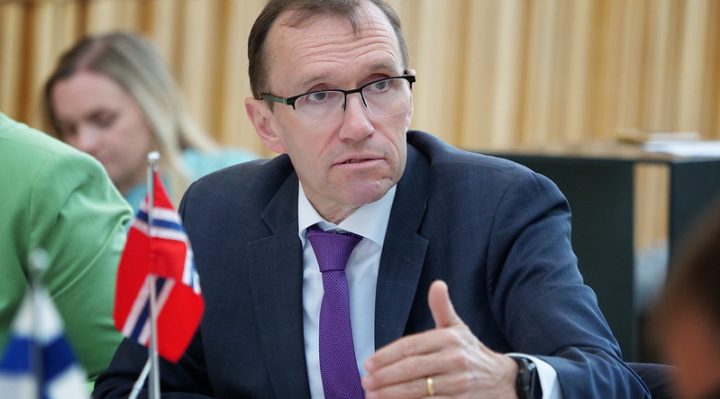OSLO, Norway — In a recent dialogue with Norwegian Foreign Journalist at the NIPS Oslo, Norwegian Foreign Minister Espen Barth Eide addressed the evolving dynamics of Norway’s foreign policy, particularly in relation to Russia and the ongoing conflict in Ukraine. The conversation highlighted the complexities of international cooperation in fisheries and the implications of geopolitical tensions.

When questioned about Russia’s recent threats of “tit-for-tat” actions against Norway regarding fishing rights, Eide emphasized that while Russia’s behavior has changed since its war in Ukraine, Norway remains committed to maintaining fisheries cooperation. He stated, “Our policy is that Russia’s behavior has changed because they violated the primary rule of international law by invading another country. Since then, our relations have changed.”
Eide underscored that the fisheries agreement is rooted in mutual self-interest, “The fish don’t care about borders.” He explained that sustainable fisheries management requires collaboration between Norway and Russia to ensure the stability of fish stocks in the Arctic. “If either country abandoned the agreement, both would be worse off,” he added, suggesting that the shared economic interests would likely prevail over political tensions.
In response to inquiries by Journalist Nadarajah Sethurupan about the potential for a new relationship with Russia, particularly in light of the U.S. developing its own ties, Eide reiterated Norway’s stance of maintaining limited political contact. He stated, “We will continue to work within the Arctic Council,” emphasizing the importance of resuming collaborative efforts in Arctic governance despite the geopolitical climate.
Eide noted that Norway’s policies would remain consistent, with no new initiatives requiring political-level meetings. “We are not proposing any change, because continuation would require the same government,” he explained, indicating that Norway’s approach is stable and focused on existing frameworks.
The conversation also touched on recent statements from Russian officials, including Ilya Shestakov, head of the Russian Federal Agency for Fisheries, who warned of potential restrictions on Norwegian fishing vessels if Norway does not reconsider its position within a month. Eide acknowledged these threats but maintained that they do not signal an end to cooperation. “We do not interpret their hints as referring to the agreement itself,” he stated.
The minister highlighted that Norway’s actions, including the fishing ban imposed on two Russian companies in July 2025, were in line with international agreements on joint management of aquatic resources. He framed these measures as necessary responses to Russia’s actions, reinforcing Norway’s commitment to uphold international law.
As Norway navigates the complexities of its foreign policy in a changing geopolitical landscape, the emphasis on cooperation in fisheries remains a cornerstone of its strategy. Foreign Minister Espen Barth Eide’s insights reflect a commitment to balancing national interests with the realities of international relations, particularly in the Arctic region. While tensions with Russia persist, the shared economic interests in sustainable fisheries may provide a pathway for continued dialogue and collaboration.
